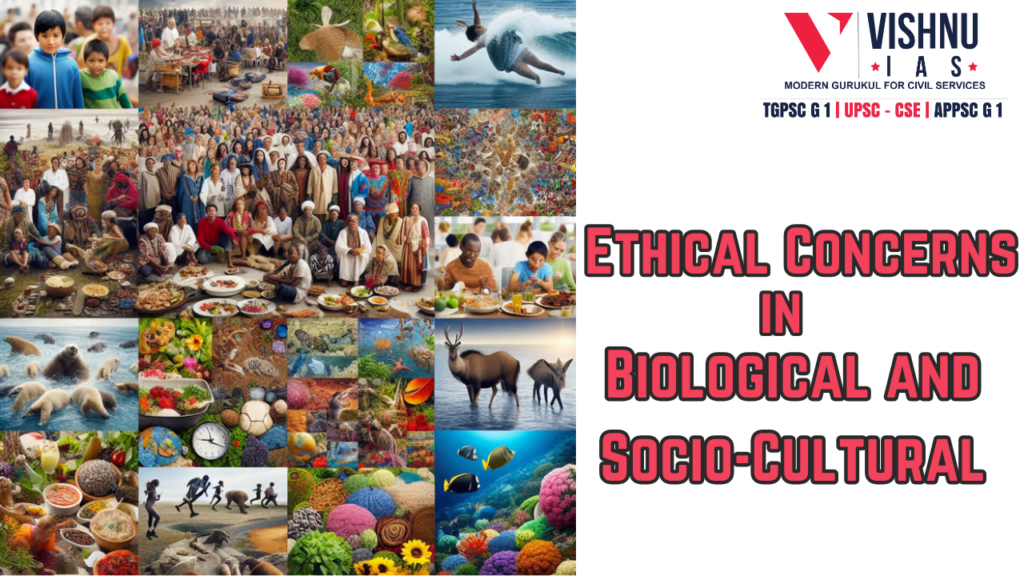Ethical Concerns in Biological and Socio-Cultural
What are the ethical concerns in biological and socio-cultural anthropology because of recent advances in Al and genetic research?
Approach
- Introduction: Write few introductory lines about the recent advances in Al and genetic research
- Body: list out the ethical concerns in biological and socio-cultural anthropology because of recent advances in Al and genetic research.
- Conclusion: Add its recent status
INTRODUCTION
Recent advances in artificial intelligence (AI) and genetic research have brought about significant ethical concerns in both biological and socio-cultural anthropology. These concerns revolve around issues of privacy, consent, data security, potential misuse of information, and the impact on vulnerable populations.
BODY
Ethical Concerns in Biological Anthropology
- Privacy and Consent:
- Genetic Data: The collection and analysis of genetic data require informed consent from participants. However, ensuring that participants fully understand the implications of genetic research can be challenging. There is a risk that genetic information could be used without proper consent, leading to privacy violations.
- AI in Data Analysis:AI technologies can analyse vast amounts of genetic data quickly, but this raises concerns about how data is stored, who has access to it, and how it might be used.
- Data Security:
- Genetic Information:Genetic data is highly sensitive and personal. Ensuring its security is paramount to prevent unauthorized access and potential misuse. Breaches in data security can lead to discrimination based on genetic information.
- AI Systems: AI systems used in genetic research must be designed with robust security measures to protect against hacking and data breaches.
- Misuse of Genetic Information:
- Discrimination:There is a risk that genetic information could be used to discriminate against individuals or groups, particularly in areas such as employment, insurance, and healthcare. This is especially concerning for marginalized communities.
- Biopiracy:The unauthorized use of genetic resources from indigenous populations without fair compensation or acknowledgment is a significant ethical issue.
- Impact on Indigenous and Vulnerable Populations:
- Exploitation:Indigenous and vulnerable populations are often subjects of genetic research. There is a risk of exploitation if their genetic resources are used without proper consent and benefit-sharing.
- Cultural Sensitivity:Research must be conducted with respect for the cultural beliefs and practices of indigenous communities. Failure to do so can lead to cultural insensitivity and harm.
Ethical Concerns in Socio-Cultural Anthropology
- Informed Consent and Autonomy:
- AI in Ethnographic Research: The use of AI to analyse ethnographic data raises questions about informed consent. Participants must be aware of how their data will be used and the potential implications.
- Autonomy: Ensuring that participants have the autonomy to withdraw from research at any time is crucial. AI systems must be designed to respect participants’ rights and choices.
- Bias and Fairness:
- Algorithmic Bias:AI systems can perpetuate existing biases if they are trained on biased data. This can lead to unfair treatment of certain groups and reinforce stereotypes.
- Fair Representation: Ensuring that AI systems fairly represent diverse cultural practices and perspectives is essential to avoid cultural homogenization.
- Data Ownership and Control:
- Community Data:In socio-cultural research, data often belongs to the community rather than individuals. Ensuring that communities have control over their data and how it is used is crucial.
- Benefit Sharing: Research should benefit the communities involved. This includes sharing findings and ensuring that communities gain from the research outcomes.
- Ethical Use of AI:
- Surveillance and Privacy: The use of AI for surveillance in socio-cultural research can infringe on privacy rights. Researchers must balance the need for data with respect for individuals’ privacy.
- Transparency:AI systems should be transparent in their operations. Participants should understand how AI is used in research and the decisions it makes.
CONCLUSION
The ethical concerns in biological and socio-cultural anthropology due to advances in AI and genetic research are multifaceted and complex. Addressing these concerns requires a commitment to ethical principles such as informed consent, privacy, data security, fairness, and respect for cultural diversity. Researchers must engage with communities, policymakers, and ethicists to navigate these challenges and ensure that their work benefits society while minimizing harm.
Anthropology Full Course at Vishnu IAS Academy
What does Course Offer?
- 4 Months (250+ Class Hours)
- Online (App + Web) / Offline / Hybrid Mode of Classes
- Live + Recorded Videos Access For 1 Year
- 2 Hour Live Class From Monday to Saturday (1.5 Hours for Class + ½ Hour for Doubt Solving)
- Foundation to Advanced Level of Teaching
- Simple and Integrated Content
- One Stop Solution Books
- Regular Value Added Content
- Current Affairs & Case Studies Modules
- Daily Answer Writing Practice
- Weekly Grand Tests On Sundays & Evaluation With Guidance and Topper Will be Rewarded
- 500+ Model Answers
- 9 AM – 9 PM Support System
- Free GS Current Affairs
- Free Interview Guidance for Anthropology


